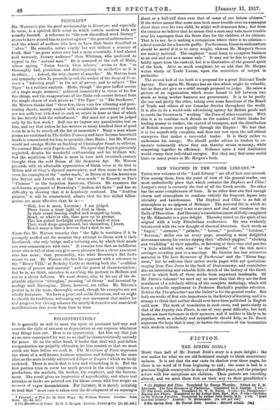PENCRAFT.*
Ma. WATSON'S plea for good workmanship in literature, and especially in verse, is a spirited little essay in which certain modem idols are soundly berated. A reference to "the now discredited word literary" seems to have stirred him to protest against " the pose of unliterariness " and the school of authors who love to have their books described as " alive." He remarks, rather cruelly but not without a measure of truth, that " no great writer ever had a more essentially, I had almost said narrowly, literary audience" than Whitman, who professed to appeal to the " natural man." He is annoyed at the cult of Blake, whose saying, " Damn braces, bless relaxes," seems to him " as thoroughly bad, pernicious, and disintegrating in aesthetics as it is in ethics . . . indeed, the very charter of anarchy." Mr. Watson loses our sympathy when he proceeds to call the author of the Songs of Inno- cence a " faltering pupil " in the art of poetry, and to subject " The Tiger " to a ruthless analysis. Blake, though " the poor baffled master of a single magic moment," achieved immortality in virtue of his few fine things, and the exaggerations of the Blake cult cannot detract from the simple charm of such pieces as " The Tiger " or " The Sunflower." Mr. Watson thinks that " these few, these very few vibrating and pene- trating chords, mostly evoked with considerable uncertainty of hand, are not sufficient title-deed to such an estate in fame as that of which he has latterly held the enfeoffment." But must not a poet be judged only by his best work ? And can we impose any quantitative test on him, and say that unless he has written so many hundred lines of good verse he is to be struck off the list of immortals ? Many a man whose poems are enshrined in The Golden Treasury and have become household words is remembered for less, in quantity, than Blake ; but Mr. Watson would not consign Waller or Suckling or Christopher Smart to oblivion. To contrast Blake with Pope is unfair. We agree that Pope is grievously neglected, despite his wonderful craftmanship and his brilliant wit; but the mysticism of Blake is more in tune with twentieth-century thought than the cold Deism of the Augustan Ago. Mr. Watson proceeds with an admirable appreciation of blank verso at its best in Milton and of Gray's rhymed masterpiece, and then turns to modem verse for examples of the " under-made," in Byron or in the Americans like Bryant and Lowell, or of the " over-made " in Rossetti or Poe's " Ulalume " or the forgotten American, Chivers. He examines the well-known argument of Browning's " Andrea del Sarto " and has no difficulty in showing that it is hopelessly confused. The "faultless painter," it will be remembered, admits that his less skilled fellow- artists are more effective than he is :—
" Well, less is more, Lucrezia : I am judged. There burns a truer light of God in them, In their vexed beating stuffed and stopped-up brain, Heart, or whate'cr else, than goes on to prompt This .low-pulsed forthright craftsman's hand of mine. Their work drops groundward, but themselves, I know, Reach many a time a heaven that's shut to me."
Upon this Mr. Watson remarks that " the light is worthless if it be promptly snuffed out the moment they attempt to illume with it their handiwork—the only bridge, and a tottering one, by which their minds can ever communicate with ours." It remains true that an indifferent artist who is full of ideas can give more pleasure than a clever executant who has none ; that, presumably, was what Browning's Del Sarto meant to say. Mr. Watson clinches his argument with a reference to the " Henry VIII." at Berkeley Castle as showing both the " confident mastery of process and material " and the power of characterization ; but he is, we think, mistaken in ascribing the portrait to Holbein and not to a clever follower. We must demur, also, to his use of the de- plorable adjective " Otwegian," meaning "of Otway" and invented by analogy with Norwegian. These, however, are trifles. Mr. Watson's protest is, in the main, thoroughly sound, though his examples are not wholly fortunate. We have a great and noble literature, and we ought to cherish its traditions, welcoming any new movement that makes for real progress, but viewing askance the merely destructive and anarchical manifestations that occur from time to time.


























 Previous page
Previous page